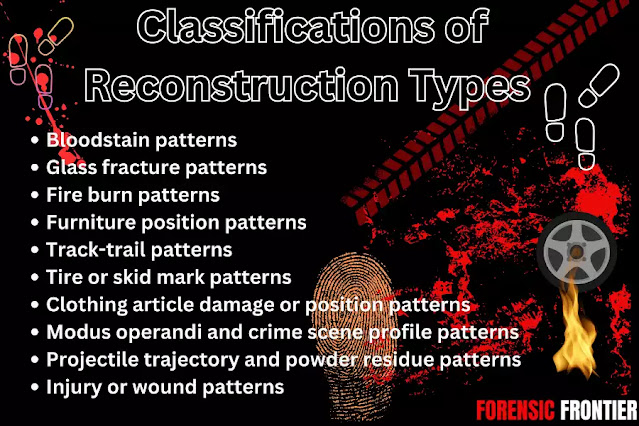Exploring Diverse Dimensions of Crime Scene Reconstruction
Introduction:
Crime scene reconstruction encompasses
various facets, shaped by the crime's nature, the expert's involvement, and the
events that transpired. This classification relies on the expert's role and is
categorized into five distinct types, each shedding light on the intricacies of
crime and events.
Classifying Reconstruction Types:
A. Specific Incident Reconstruction:
1. Accident Reconstruction:
- Traffic:
Cars, trucks, motorcycles
- Other
transportation: Trains, planes, boats
- Industrial/Construction:
Collapses, machinery accidents
2. Specific
Crime Reconstruction:
- Homicide
- Arson
- Rape
- White-collar
crime
- Other
specific crimes
B. Specific Events Reconstruction:
- Sequence,
directional, positional, relational, conditional, identity determination
C. Degree of Involvement Reconstruction:
- Total case,
partial case, limited event, specific pattern reconstruction
D. Specific Type of Physical Evidence Reconstruction:
- Pattern
evidence
- Shooting
investigation evidence
- Serological
evidence
E. Special Areas in Reconstruction:
- Criminal
profiling (MO, motive)
- Scene
profiling (Primary/secondary scenes)
Pattern Evidence in Reconstruction:
Pattern evidence, a common type encountered at crime scenes, plays a pivotal role in reconstructing events. Impressions, markings, and fractures offer insights into actions, disproving alibis, linking individuals or objects, and guiding investigations.
Common Pattern Evidence:
- Bloodstain,
glass fracture, fire burn patterns
- Furniture,
track trail, tire mark patterns
- Clothing
damage, modus operandi patterns
- Projectile
trajectory, wound patterns
Conclusion:
Crime scene reconstruction is a dynamic
process, encompassing diverse classifications and pattern evidence analysis.
Thorough documentation and scientific techniques amplify the understanding of
events, directing investigations toward justice.




.webp)


.webp)

.webp)
.webp)




.png)

0 Comments
If you have any doubts, let me know.